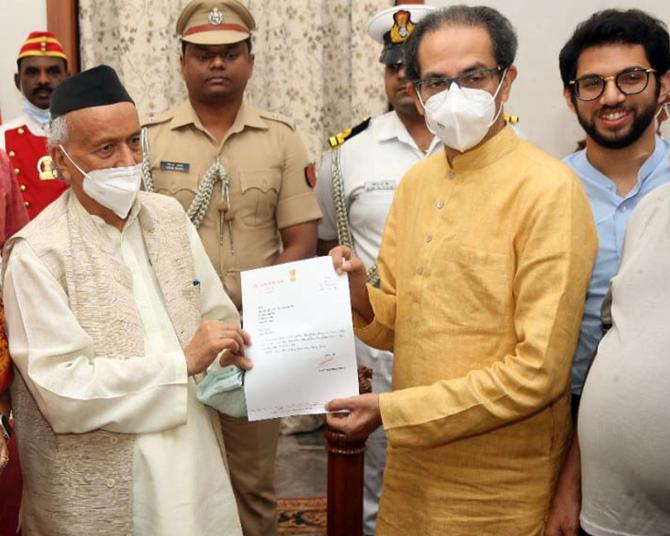Eknath Shinde will continue as the chief minister of Maharashtra, with the Supreme Court holding on Thursday that it cannot restore the then Maha Vikas Aghadi (MVA) government led by Uddhav Thackeray as he resigned without facing a floor test in June last year.

The court also pulled up former Maharashtra governor Bhagat Singh Koshyari and said he did not have reasons based on objective material before him to arrive at the conclusion that then chief minister Thackeray had lost the confidence of the House.
In a unanimous verdict on a batch of pleas related to the political crisis that led to the fall of the three-party MVA government following a revolt by the Shinde faction in the Shiv Sena, a five-judge Constitution bench headed by Chief Justice D Y Chandrachud held that the then speaker's decision to appoint Bharat Gogawale of the Shinde faction as the whip of the Shiv Sena in the Maharashtra assembly was "contrary to law".
The bench said, "The governor was not justified in calling upon Mr Thackeray to prove his majority on the floor of the House because he did not have reasons based on objective material before him to reach the conclusion that Mr Thackeray had lost the confidence of the House. However, the status quo ante cannot be restored because Mr Thackeray did not face the floor test and tendered his resignation."
The bench, also comprising Justices M R Shah, Krishna Murari, Hima Kohli and P S Narasimha, said, "The governor had no objective material on the basis of which he could doubt the confidence of the incumbent government. The resolution on which the governor relied did not contain any indication that the MLAs wished to exit from the MVA government. The communication expressing discontent on the part of some MLAs is not sufficient for the governor to call for a floor test."
It added that the governor ought to apply his mind to the communication (or any other material) before him to assess whether a government has lost the confidence of the house.
"We use the term 'opinion' to mean satisfaction based on objective criteria as to whether he possessed relevant material, and not to mean the subjective satisfaction of the governor. Once a government is democratically elected in accordance with law, there is a presumption that it enjoys the confidence of the house. There must exist some objective material to dislodge this presumption," the court said.
It added that the MLAs did not express their desire to withdraw support from the MVA government in the resolution dated June 21, 2022m and even if it is assumed that they had implied that they intended to exit from the government, they only constituted a faction of the Shiv Sena legislature party (SSLP) and were, at the most, indicating their dissatisfaction with the course of action adopted by their party.
"The political imbroglio in Maharashtra arose as a result of party differences within the Shiv Sena. However, the floor test cannot be used as a medium to resolve internal party disputes or intra-party disputes," the bench said.
It added that "dissent and disagreement" within a political party must be resolved in accordance with the remedies prescribed under the party constitution or through any other method that the party chooses to opt for.
"There is a marked difference between a party not supporting a government and individuals within a party expressing their discontent with their party leadership and functioning," the court observed.
It said neither the Constitution nor the laws enacted by Parliament provide for a mechanism by which disputes among the members of a particular political party can be settled.
"They certainly do not empower the governor to enter the political arena and play a role (however minute) either in inter-party disputes or in intra-party disputes. It follows from this that the governor cannot act upon an inference that he has drawn that a section of the Shiv Sena wished to withdraw its support to the government on the floor of the House.
"Therefore, the governor erred in relying upon the resolution signed by a faction of the SSLP MLAs to conclude that Mr Thackeray had lost the support of the majority of the House," the bench said.
Justice Chandrachud, who wrote the 141-page verdict on behalf of the bench, said the governor was justified in inviting Shinde to form the government.
"The post of chief minister of the state of Maharashtra fell vacant after the resignation of Mr Thackeray on June 29, 2022. The leader (Devendra Fadnavis) of the party (BJP) that had returned the highest number of candidates to the state Assembly extended support on behalf of the party to Mr Shinde. Thus, the decision of the governor dated June 30, 2022, inviting Mr Shinde to form the government was justified," the bench said.
The top court also dealt with the question of whip and said a political party and not a legislature party appoints its whip and leader in the House.
It said a speaker must only recognise the whip appointed by a political party and in this case, the speaker's decision recognising Gogawale as the Shiv Sena chief whip was "illegal" because it was based on the resolution of a faction of the SSLP, without undertaking an exercise to determine if it was the decision of the political party.
The top court also referred the 2016 Nabam Rebia verdict pronounced by a five-judge Constitution bench relating to the speaker's power on disqualification of MLAs to a larger bench of seven judges, saying a substantial question of law remains to be settled.
"To give quietus to the issue, we refer the following question (and any allied issues which may arise) to a larger bench: whether the issuance of a notice of intention to move a resolution for the removal of the speaker restrains them from adjudicating disqualification petitions under the Tenth Schedule of the Constitution. The matter may be placed before the Chief Justice for appropriate orders," the bench directed.
The 2016 judgment dealt with the powers of an assembly speaker and ruled that he or she cannot proceed with pleas for disqualification of MLAs if a prior notice seeking the speaker's removal is pending before the House.
The bench said an MLA has the right to participate in the proceedings of the House regardless of the pendency of any petition for his disqualification and the validity of the proceedings of the House in the interregnum is not "subject to" the outcome of such disqualification petitions.
On the disqualification proceedings of Shiv Sena MLAs, the bench said the court cannot ordinarily adjudicate petitions for disqualification under the Tenth Schedule in the first instance and the speaker must decide the petitions within a reasonable period.
The top court said the speaker and the Election Commission (EC) are empowered to concurrently adjudicate on the petitions before them under the Tenth Schedule and under the provisions of the Symbols Order respectively.
In a blow to the Thackeray bloc earlier this year, the EC declared the Shinde faction as the real Shiv Sena and allotted the bow-and-arrow election symbol of the party founded by Balasaheb Thackeray to it.










